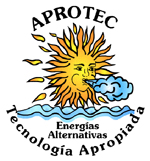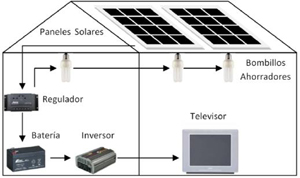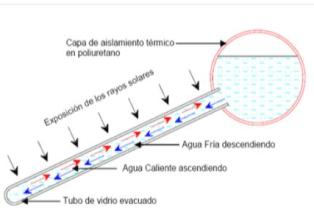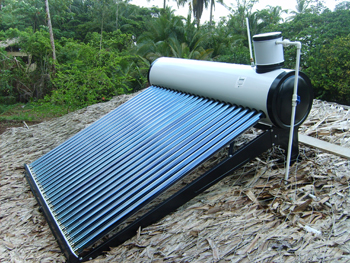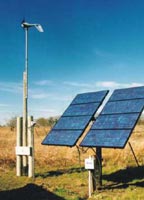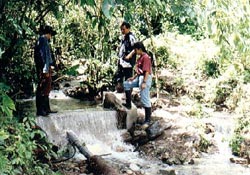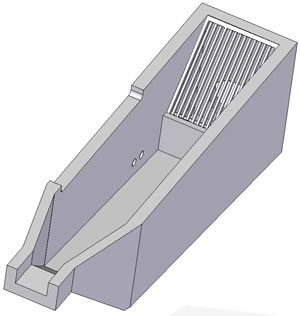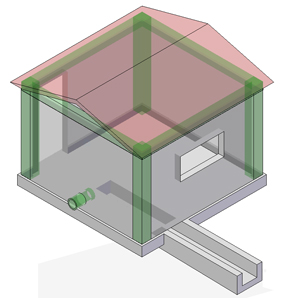Difference between revisions of "Aprotec"
| Line 1: | Line 1: | ||
| + | [[Image:Aprotec.jpg|thumb|right|150px|Aprotec]][[Image:Photovoltaic solar power system.jpg|thumb|right|150px|Photovoltaic solar power system]] | ||
| + | [[Image:thermosyphon.jpg|thumb|right|150px|thermosyphon]] | ||
| + | [[Image:solar heater.jpg|thumb|right|150px|solar heater]] | ||
| + | [[Image:windmill with solar panels.jpg|thumb|right|150px|Windmill with solar panels]] | ||
| + | [[Image:PICO hydropower.jpg|thumb|right|150px|PICO hydropower]] | ||
| + | [[Image:intake for water in micro-hydropower system.jpg|thumb|right|150px|intake for water in micro-hydropower system]] | ||
| + | [[Image:Powerhouse.jpg|thumb|right|150px|Powerhouse]] | ||
| + | |||
APROTEC is a company, which develops technologies and systems for the use of renewable energy. They focus on the efficient use of energy and respect for the environment of technologies in social development projects. They were founded in 1990 and are based in Columbia. | APROTEC is a company, which develops technologies and systems for the use of renewable energy. They focus on the efficient use of energy and respect for the environment of technologies in social development projects. They were founded in 1990 and are based in Columbia. | ||
| − | |||
| − | |||
Aprotec deals with several aspects in the field of renewable energy technologies, from the promotion and commercialisation to the development and production of these. | Aprotec deals with several aspects in the field of renewable energy technologies, from the promotion and commercialisation to the development and production of these. | ||
| Line 10: | Line 16: | ||
==Photovoltaic solar power== | ==Photovoltaic solar power== | ||
Photovoltaic cells directly convert sunlight into electricity. There are two methods of implementation. In an ‘isolated’ system, all the energy from the solar panels is collected in batteries. This can then be converted into an AC current, using a transformer. This system Solar energy can also be used as an ‘interconnected network’ where the panels are connected directly to the AC local power grid. | Photovoltaic cells directly convert sunlight into electricity. There are two methods of implementation. In an ‘isolated’ system, all the energy from the solar panels is collected in batteries. This can then be converted into an AC current, using a transformer. This system Solar energy can also be used as an ‘interconnected network’ where the panels are connected directly to the AC local power grid. | ||
| − | |||
| − | |||
==Thermal solar Power== | ==Thermal solar Power== | ||
Solar Heaters: These work by heating water in a tank. There are two systems for this, the thermosyphon method and the gravity system. They also developed a system to directly use solar energy for maintaining the temperature of outdoor swimming pools. It primarily uses the existing pump used for purifying the water to circulate the water and a thermostat. | Solar Heaters: These work by heating water in a tank. There are two systems for this, the thermosyphon method and the gravity system. They also developed a system to directly use solar energy for maintaining the temperature of outdoor swimming pools. It primarily uses the existing pump used for purifying the water to circulate the water and a thermostat. | ||
| − | |||
| − | |||
| − | |||
| − | |||
==Wind Power== | ==Wind Power== | ||
Aprotec also sells wind generators, which convert wind energy into electricity. They have also developed a system, which uses wind energy to pump water from the ground. Further in certain areas, windpower can be used in combination with solar power, for times when the wind is quiet. | Aprotec also sells wind generators, which convert wind energy into electricity. They have also developed a system, which uses wind energy to pump water from the ground. Further in certain areas, windpower can be used in combination with solar power, for times when the wind is quiet. | ||
| − | |||
Further they offer specialised equipment for measuring the wind potential of areas. These are leaning towers with a height of 30-60m, with sensors to measure the wind speed, wind direction, temperature, humidity and pressure at different heights. This information is then stored digitally and transmitted to collection centres for analysis. | Further they offer specialised equipment for measuring the wind potential of areas. These are leaning towers with a height of 30-60m, with sensors to measure the wind speed, wind direction, temperature, humidity and pressure at different heights. This information is then stored digitally and transmitted to collection centres for analysis. | ||
| Line 28: | Line 27: | ||
==Hydropower== | ==Hydropower== | ||
PICO hydropower: Aprotec designed a system that uses hydropower from small water sources and converts it to direct current electricity. The water is filtered, cleaned and transported to through PVC pipes to turbines. The electric current produced here is then transported to a charging centre, where people can recharge batteries. | PICO hydropower: Aprotec designed a system that uses hydropower from small water sources and converts it to direct current electricity. The water is filtered, cleaned and transported to through PVC pipes to turbines. The electric current produced here is then transported to a charging centre, where people can recharge batteries. | ||
| − | |||
| − | |||
Micro-hydropower systems are ones, which use water as an energy resource in a sustainable manner, without damaging the environment. For example, they don’t require dams and so don’t cause flooding, unlike many hydropower systems. | Micro-hydropower systems are ones, which use water as an energy resource in a sustainable manner, without damaging the environment. For example, they don’t require dams and so don’t cause flooding, unlike many hydropower systems. | ||
| Line 35: | Line 32: | ||
The Aprotec system takes in water from any stream or similar water source. The water is passed through a sandtrap and forebay to filter out any suspended solids from the water. Then the water is transported through pressured pipes to the powerhouse where the turbines and generators are located. Additional equipment for regulating the quality of water, etc. is also installed here. | The Aprotec system takes in water from any stream or similar water source. The water is passed through a sandtrap and forebay to filter out any suspended solids from the water. Then the water is transported through pressured pipes to the powerhouse where the turbines and generators are located. Additional equipment for regulating the quality of water, etc. is also installed here. | ||
| − | River Turbines: Together with the company ITDG, Aprotec is developing river turbines, to exploit the kinetic energy of rivers. The technology is being used in Africa already, but needs to be adapted to suit the conditions in different rivers in the Amazon for example. | + | River Turbines: Together with the company ITDG, Aprotec is developing river turbines, to exploit the kinetic energy of rivers. The technology is being used in Africa already, but needs to be adapted to suit the conditions in different rivers in the Amazon for example. |
| − | |||
| − | |||
| − | |||
| − | |||
| − | |||
Revision as of 08:36, 19 October 2009
APROTEC is a company, which develops technologies and systems for the use of renewable energy. They focus on the efficient use of energy and respect for the environment of technologies in social development projects. They were founded in 1990 and are based in Columbia.
Aprotec deals with several aspects in the field of renewable energy technologies, from the promotion and commercialisation to the development and production of these. APROTEC performs feasibility studies, field analysis and evaluation of available natural resources and their possible uses, in particular in the area of supplying electricity to rural, isolated communities. It designs, sells and installs complete systems for alternative energy. They also work as consultants to other NGOs, public and private organisations for the adaptation of technologies in the field of renewable energy.
The technologies they are selling now include:
Photovoltaic solar power
Photovoltaic cells directly convert sunlight into electricity. There are two methods of implementation. In an ‘isolated’ system, all the energy from the solar panels is collected in batteries. This can then be converted into an AC current, using a transformer. This system Solar energy can also be used as an ‘interconnected network’ where the panels are connected directly to the AC local power grid.
Thermal solar Power
Solar Heaters: These work by heating water in a tank. There are two systems for this, the thermosyphon method and the gravity system. They also developed a system to directly use solar energy for maintaining the temperature of outdoor swimming pools. It primarily uses the existing pump used for purifying the water to circulate the water and a thermostat.
Wind Power
Aprotec also sells wind generators, which convert wind energy into electricity. They have also developed a system, which uses wind energy to pump water from the ground. Further in certain areas, windpower can be used in combination with solar power, for times when the wind is quiet.
Further they offer specialised equipment for measuring the wind potential of areas. These are leaning towers with a height of 30-60m, with sensors to measure the wind speed, wind direction, temperature, humidity and pressure at different heights. This information is then stored digitally and transmitted to collection centres for analysis.
Hydropower
PICO hydropower: Aprotec designed a system that uses hydropower from small water sources and converts it to direct current electricity. The water is filtered, cleaned and transported to through PVC pipes to turbines. The electric current produced here is then transported to a charging centre, where people can recharge batteries.
Micro-hydropower systems are ones, which use water as an energy resource in a sustainable manner, without damaging the environment. For example, they don’t require dams and so don’t cause flooding, unlike many hydropower systems.
The Aprotec system takes in water from any stream or similar water source. The water is passed through a sandtrap and forebay to filter out any suspended solids from the water. Then the water is transported through pressured pipes to the powerhouse where the turbines and generators are located. Additional equipment for regulating the quality of water, etc. is also installed here.
River Turbines: Together with the company ITDG, Aprotec is developing river turbines, to exploit the kinetic energy of rivers. The technology is being used in Africa already, but needs to be adapted to suit the conditions in different rivers in the Amazon for example.
